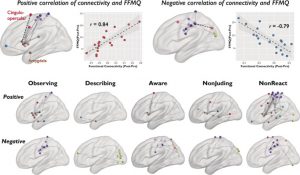Change the Brain to Improve Emotion Regulation in Bereaved Individuals with Mindfulness
By John M. de Castro, Ph.D.
“It takes a boat load of self-compassion to allow oneself to feel whatever it is you are feeling at any given time, without judgment, without comparison relative to another’s explicit portrayal of their own process. In this way, to grieve is to be mindful of our thoughts and feelings.” – Jennifer Wolkin
Grief is a normal, albeit complex, process that follows a loss of a significant person or situation in one’s life. This can involve the death of a loved one, a traumatic experience, termination of a relationship, relationship to a long-missing person, etc. Exactly what transpires depends upon the individual and the nature of the loss. It involves physical, emotional, psychological and cognitive processes. In about 15% of people grief can be overly intense or long and therapeutic intervention may become necessary.
Mindfulness practices have been found to help with coping with loss and its consequent grief. Mindfulness-Based Cognitive Therapy (MBCT) was specifically developed to treat depression. MBCT involves mindfulness training, containing sitting, walking and body scan meditations, and cognitive therapy that is designed to alter how the patient relates to the thought processes that often underlie and exacerbate psychological symptoms. Mindfulness training has been shown to change the size, activity and connectivity of brain structures. Hence, MBCT may reduce grief by altering the brain.
In today’s Research News article “Mindfulness-based cognitive therapy on bereavement grief: Alterations of resting-state network connectivity associate with changes of anxiety and mindfulness.” (See summary below or view the full text of the study at: https://www.ncbi.nlm.nih.gov/pmc/articles/PMC7775995/ ) Huang and colleagues recruited adults who had lost a first degree relative within the last 4 years and had unresolved grief. The patients received an 8-week program of Mindfulness-Based Cognitive Therapy (MBCT). They met weekly for 2.5 hours and were encouraged to practice for 45 minutes daily at home. They were measured before and after the training for grief, generalized anxiety, depression, emotion regulation, and mindfulness. After training they underwent brain functional Magnetic Resonance Imaging (fMRI) at rest and while viewing pictures of faces with either neutral or negative emotional expressions.
They found that in comparison to baseline, after Mindfulness-Based Cognitive Therapy (MBCT) the participants had significant increases in mindfulness, particularly the describing and non-reacting mindfulness facets, and emotion regulation and significant decreases in grief, anxiety, and depression. The brain connectivity as revealed in the fMRI scans changed after MBCT training with decreased connectivity within the Default Mode Network of the brain and connectivity between the Auditory, Visual, Salience, and frontal-parietal networks during rest but not emotion arousal. In addition, the connectivity between the subcortical caudate with the cortex correlated positively with mindfulness and emotion regulation and negatively with anxiety.
The Default Mode Network is thought to underly mind wandering and self-referential thinking. So, the decreases in connectivity may signal heightened present moment awareness. In addition, the changes in the connectivity between cortical areas were negatively related to emotion regulation while the connectivity between cortical and subcortical areas were positively related to emotion regulation. This suggests that MBCT training decreased effects of external perception on emotion regulation while increasing the effects of internal sensations.
It should be noted that there wasn’t a comparison, control, condition. So, the passage of time, participant expectancy effects, attentional effects, or experimenter bias may have been responsible for the observed changes. Nevertheless, the results suggest that MBCT training for bereaved patients improves their mental health and reduces grief. The brain scans suggest that the training altered the brain to increase present moment awareness and dependence of the person’s internal state in regulating emotions.
So, change the brain to improve emotion regulation in bereaved individuals with mindfulness.
“Mindfulness practice is not meant to minimize that pain or to convince people that everything is OK, but rather to help you recognize the reality of your circumstances, and to do so in a nonjudgmental and self-compassionate way.” – Stephanie Pritchard
CMCS – Center for Mindfulness and Contemplative Studies
This and other Contemplative Studies posts are also available on Google+ https://plus.google.com/106784388191201299496/posts and on Twitter @MindfulResearch
Study Summary
Huang, F. Y., Hsu, A. L., Chao, Y. P., Shang, C. M., Tsai, J. S., & Wu, C. W. (2020). Mindfulness-based cognitive therapy on bereavement grief: Alterations of resting-state network connectivity associate with changes of anxiety and mindfulness. Human brain mapping, 42(2), 510–520. Advance online publication. https://doi.org/10.1002/hbm.25240
Abstract
Bereavement, the experience of losing a loved one, is one of the most catastrophic but inevitable events in life. It causes grief and intense depression‐like sadness. Recent studies have revealed the effectiveness and proficiency of mindfulness‐based cognitive therapy (MBCT) in emotional regulation among bereavement populations. MBCT improves the well‐being of the bereaved by enhancing cognitive performances. Regarding the neural correlates of bereavement grief, previous studies focused on the alleviation of emotion–cognition interferences at specific brain regions. Here, we hypothesized that the bereavement grief fundamentally triggers global alterations in the resting‐state brain networks and part of the internetwork connectivity could be reformed after MBCT intervention. We recruited 19 bereaved individuals who participated the 8‐week MBCT program. We evaluated (a) the large‐scale changes in brain connectivity affected by the MBCT program; as well as (b) the association between connectivity changes and self‐rated questionnaire. First, after MBCT, the bereaved individuals showed the reduction of the internetwork connectivity in the salience, default‐mode and fronto‐parietal networks in the resting state but not under emotional arousal, implying the alleviated attention to spontaneous mind wandering after MBCT. Second, the alterations of functional connectivity between subcortical (e.g., caudate) and cortical networks (e.g., cingulo‐opercular/sensorimotor) were associated with the changes of the mindfulness scale, the anxiety and the emotion regulation ability. In summary, MBCT could enhance spontaneous emotion regulation among the bereaved individuals through the internetwork reorganizations in the resting state.
https://www.ncbi.nlm.nih.gov/pmc/articles/PMC7775995/
